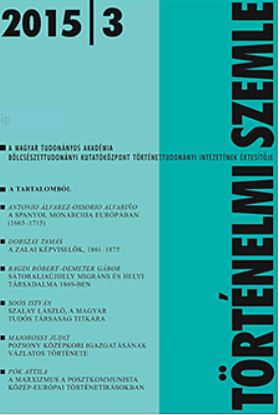A zalai képviselők, 1861–1875
The MPs of Zala, 1861–1875
Author(s): Tamás DobszaySubject(s): Political history, 19th Century
Published by: Magyar Tudományos Akadémia Bölcsészettudományi Kutatóközpont Történettudományi Intézet
Keywords: Zala; 1861–1875; MPs; Hungary; history;
Summary/Abstract: The study analyses the social situation and origin, and the career of those twenty one MPs who were elected in Zala county in the four terms between 1861 and 1875. While the implementation of the parliamentary system in Hungary triggered changes in both the functioning of the parliament and the situation of its members that were related to the suppression of the old order of estates and the birth of popular representation, previous features remained effective as well. For two thirds of the elected MPs their constituencies were closely related to their place of origin or habitation, or to the position of their estates, a clear sign of their strong embeddedness in local society. In case of three further MPs only an attachment to the county can be proved. They continued the pre-1848 tradition, which regarded the entirety of the county as a political community. There were only three politicians of a national level who cannot be inserted at all into county society. Thus, attachment to local society was still an expectation then, the electors only slowly acquiescing in the new system which represented national instead of local interests. All those elected were of noble origins, a reflection of the county’s predominantly agrarian character and low level of urbanization, but also of the importance of its noble masses who had managed to transmit their right to vote to the new parliamentary age. After the intermezzo of 1848, this social context only produced the first non-noble MPs after 1875. Most of the representatives were lawyers, as the rhetorical skills and political learning that were necessary in the political life could be acquired in the course of legal studies. As for the relationship between parliamentary work and county offices, whereas before 1848 the county envoys, most frequently elected from the local nobility and assuming county office as well, constituted a strong link between political life at national and county level, in the modern state the traditional combination of parliamentary representation with local office could no longer be maintained: the MPs were bound to choose between continuous legislative work and the local bureaucracy, between the capital and the county. The traditional, independent politicians of the old world had to cede their place to professional politicians. The incompatibility laws only accomplished this long process.
Journal: Történelmi Szemle
- Issue Year: 2015
- Issue No: 03
- Page Range: 363-379
- Page Count: 17
- Language: Hungarian

